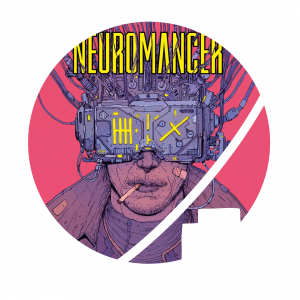- Book written by William Gibson
- Published 1 July 1984
- Part 1 in the Sprawl Trilogy
William Gibson’s debut novel Neuromancer is the work that defined and almost single-handedly established the Cyberpunk genre. It is the story of Henry Case, a washed up hacker that is wasting his life away as a drug addict in the underworld of Japanese Chiba, until he gets picked up by Molly, a mercenary in the service of one Armitage, an ex-special forces agent, who needs Case’s hacking skills for a job unlike any Case ever tried before.


There is one thing you need to know before you start reading this book, and that is that when it was written in 1984, the internet did not (really) exist (its development is complicated, but it was not publicly accessible). Gibson wrote Neuromancer on a typewriter and bought his first computer with the royalties. It is absolutely amazing, therefore, that Gibson predicted a world with a globally linked computer system, advanced artificial intelligence, portable computers, and a virtual reality internet interface that visualised data as buildings and interactable programs as people. In his novel (and the short stories that he wrote in the years before), he coined the terms cyberspace and ‘the matrix’ (as applied to the visual representation of a computer programme). That alone should make you want to pick up this book.
But Gibson did not just have ideas that were way ahead of his time. The novel also has a great balance between building the world, action sequences, and character moments delving into the backgrounds and relationships of the characters. The strongest element, however, is that it oozes atmosphere, from the corpocratic world of Chiba city in the shadows of Tokyo, where drug dealers and hardware fences mix with Yakuza operatives and the occasional corporate clerk looking for something illegal, to the bazaar of Istanbul, where spices are sold over the same counter as software of dubious legality, next to the stuffed skin of a now-extinct horse, to the extravagant satellite Freeside, a Las Vegas in the sky that is home of casinos, brothels, and the villa’s of the super-rich.
Gibson’s prose is evocative, and I find that he has the talent to say a lot in a few lines. Like many top-tier writers of science-fiction, he hints at the past of his world with a few throwaway lines, leaving the reader’s imagination to fill in the gaps. In other places, he takes time to describe the gritty world that his characters inhabit, which came to define the cyberpunk genre. You could argue that Gibson has been more influential for cyberpunk than Tolkien has been for fantasy.
As we’ve now come to expect of a cyberpunk novel, Neuromancer is a book that takes a very negative view of humanity. The characters are eternally in conflict with each other, and each is looking for meaning in a world that seems to offer very little. However, where characters caught in dark thought spirals can feel artificial and unnecessarily edgy at times, I found that Gibson managed to write his characters’ brooding in a way that engaged me emotionally. It also helped, of course, that the world the characters had to live in was such a dark place. And while the novel overall is pretty bleak, there are enough light moments to make it all bearable.
All in all, I think that Neuromancer is rightfully one of the classics of the genre. I really enjoyed reading it, and I keep catching myself thinking back to it. Unless you have a particularly strong dislike for stories with a dark tone, I think that really anyone who hasn’t tried it yet should give this book a shot – after all, it was so wonderfully imaginative that it defined a genre of its own.





